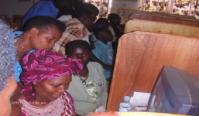Providing Connectivity doesn’t Guarantee Women Have Access
 Despite efforts over the past several years, to bring ICTs to rural areas of Uganda, assessments show most of these initiatives have been dominated by men. In the Rwenzori Region of Western Uganda, Toro Development Network (ToroDev) works to make sure women have access to this connectivity as well. More gender sensitive intervention is needed to enable the local population generate and exchange reliable information in a relevant local content on their own, enhance gender advocacy and sensitization programmes that target to improve the status of women and share knowledge by building an electronic community and networks, especially in the agricultural and agro-business sector. Over 80% rural women depend on small-scale agriculture and agro-business sector in the region.
Despite efforts over the past several years, to bring ICTs to rural areas of Uganda, assessments show most of these initiatives have been dominated by men. In the Rwenzori Region of Western Uganda, Toro Development Network (ToroDev) works to make sure women have access to this connectivity as well. More gender sensitive intervention is needed to enable the local population generate and exchange reliable information in a relevant local content on their own, enhance gender advocacy and sensitization programmes that target to improve the status of women and share knowledge by building an electronic community and networks, especially in the agricultural and agro-business sector. Over 80% rural women depend on small-scale agriculture and agro-business sector in the region.
Many gender, social, cultural beliefs marginalize women in all aspects of positive livelihoods in this region including access and use of quality information. ICTs cannot sustainably impact the Rwenzori rural community of Western Uganda (Kabarole and Kyenjojo districts) unless the women, who make up 63% of the total population, are given special attention. Customized ICT-enabled production, capacity/skills building and marketing tools that empower women in the agricultural sector are therefore imperative in this case.
What Toro Development Network (ToroDev) does to address this issue:
ToroDev is a community based NGO established in 2005 to promote the use of appropriate ICTs for sustainable and gender sensitive socio-economic community development of both men and women in the rural Rwenzori region of western Uganda. Its current operations cover the districts of Kabarole and Kyenjojo. For the past two years, ToroDev has been involved in community ICT4D awareness programmes using two community radios, holding sensitization workshops and writing ICT4D articles in local newspapers and bulletins with special attention on building the lobbying capacity of the marginalized youth and women to access and use relevant community information on their own[4] and communicate their development needs to local leaders – Local government and eventually influence ICT policy formulation at central government level.
At the beginning of 2006, after a community Information Needs Assessment survey, ToroDev embarked on a campaign of establishing of an ICT4D Research and Resource Centre in the Toro community (Kabarole and Kyenjojo districts) of the Rwenzori Region. The centre would later support its research, documentation, lobbying and advocacy, train rural men and women and facilitate knowledge sharing for best production practices among small-scale farmers and help them to access quality marketing opportunities at local, regional and international levels. This project was nominated and selected finalist in the prestigious Stockholm Challenge Award 2008. The project has so far brought together ten (10) main community based NGOs in the region to contribute resources and establish a bigger community owned telecentre facility “Kabarole Information Centre” whose one aim, among many others, is to train 700 women community development workers by 2011.
ToroDev approaches the improvement of small-scale agricultural production in the region using customized, affordable and relevant Information and Communication Technologies for Development (ICT4D). These are tools that efficiently facilitate cheap and instant access to information from community, regional, national and international level streams. Through the partnership with instititutions like SATNET (Sustainable Agricultural Trainers Network) IMARK (Information Management Resource Kit) group in collaboration with FAO, CTA and APC, ToroDev is piloting the strategy of “Building Electronic Communities and Networks” through training community workers how to use simple modern Web 2.0 Tools[5] to produce and manage agricultural information in the two districts of Kabarole and Kyenjojo. This information is needed by local small scale farmers to improve their production practices, add value to their products and have opportunities to access regional, national and international markets. Over 80% women living in these two rural districts make their livelihood out of small scale farming. Effective use of simple ICT4D (Web 2.0) tools reduces production and post harvest costs like transportation of agricultural produce to nearest market places, increase rural women farmers total revenues and therefore, improve their livelihoods and those of their community members.
Johnstone Baguma-Kumaraki, the Author is Executive Director, Toro Development Network (ToroDev)







































